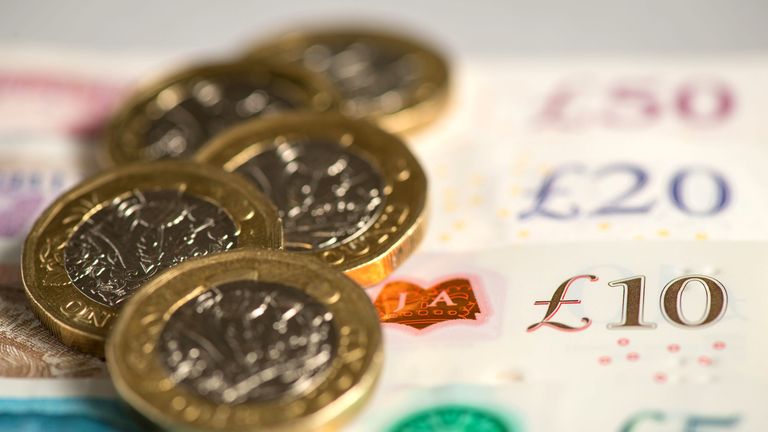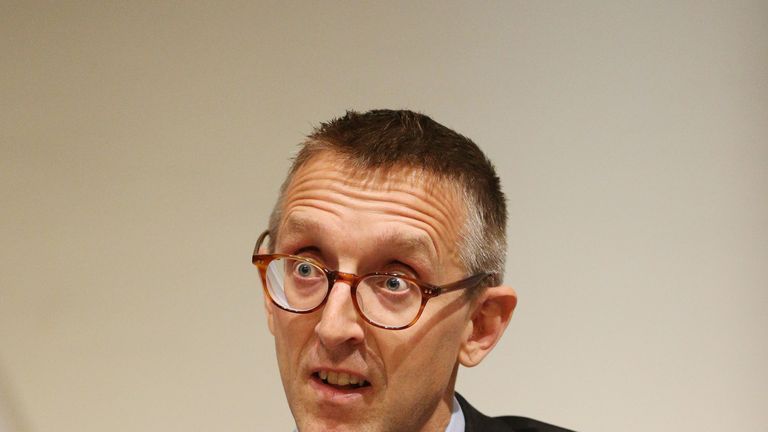Coronavirus: Axing bank dividends will hit millions of small investors
Lenders in the UK were slow to act but came under pressure from the Bank of England to stop the shareholder pay-outs.
Thursday 2 April 2020 06:36, UK
There had been a growing air of inevitability during this coronavirus crisis that Britain's banks would have to call off their dividend payments.
During the last two weeks, an expanding list of leading companies, including the advertising and marketing giant WPP, the broadcaster ITV, the builders merchant Travis Perkins, the housebuilder Persimmon and the retailers Next and Marks & Spencer, had all cancelled their latest dividend payments to conserve cash.
Pressure on the UK's lenders began to build when, on Friday last week, the European Central Bank told lenders in the Eurozone not to pay any dividends until 1 October this year and also to "refrain" from share buybacks.
Yet, when it came to the British banks, things moved a little more slowly.
That was for a couple of reasons.
The first is that the Bank of England was reluctant to order the banks to take the step.
Threadneedle Street has always preferred, traditionally, for banks to respond to a 'raised eyebrow' from the Bank of England Governor than to issue diktats.
Secondly, the banks were themselves reluctant to cancel the dividends themselves, due to unease at how their shareholders might react.
Banking shares had already endured a rotten start to the year.
Barclays and RBS, for example, have almost halved in value.
These latest developments have sent their shares down further.
There was also a sense among both lenders and their shareholders that, following more stringent regulation during the post-crisis years, the banks are sufficiently well-capitalised to be able to make their dividend payments without compromising their ability to lend during this extraordinary period.
With things dragging, the Prudential Regulation Authority - the arm of the Bank that oversees the stability of the financial sector - stepped up the pressure on Tuesday.
The PRA's chief executive, Sam Woods, urged banking executives to think how it would look to the public if they continued to pay dividends while the economy was reeling from the effects of coronavirus.
This was followed with a threat that, if the banks did not comply by 8pm on Tuesday evening, it would order them to do so.
He also urged the banks not to make cash bonus payments to employees or to carry out share buybacks - a way of distributing surplus capital that has become increasingly popular in recent years due to its tax advantages over dividend payments.
The timing was significant because, this Friday, Barclays was due to become the first of the lenders to make a payout - with £1.04bn destined for its shareholders.
The PRA even gave the banks a template letter in which they could explain their decision to shareholders.
Accordingly, at 8pm on Tuesday evening, the UK's five quoted lenders - HSBC, Barclays, Lloyds, RBS/NatWest and Standard Chartered - issued synchronised statements announcing that dividend payments had been cancelled.
Included in the scope of the move was Santander UK and Nationwide Building Society; the latter, even though as a mutual it does not pay dividends, still makes bonus payments to some employees.
Nor were insurers, who are also supervised by the PRA, spared.
While Mr Woods did not order them to cancel dividend payments or bonuses, he urged the boards of insurers "to pay close attention to the need to protect policyholders and maintain safety and soundness and, in so doing, to ensure that their firm can play its full part in supporting the real economy throughout the economic disruption arising from COVID-19."
It would be no surprise to see some insurers curtailing their distributions to shareholders in coming days.
The share price reaction suggests the outcome is worse than investors had expected.
Many had assumed dividend payments would merely be suspended rather than cancelled outright.
The sell-off in shares of HSBC in particular suggested some investors thought that, with the bank's big shareholder base in Asia, the Bank might not apply the same pressure to it as it might to the UK's domestic lenders.
HSBC itself appeared to acknowledge that when, in its statement, it said it "regrets the impact this cancellation will have on our shareholders, including our retail shareholders in Hong Kong".
That sense of surprise applies even more so in the case of the insurance sector, as shown by the falls of between 6-9% in shares of the biggest players in the sector, such as Prudential, Aviva and Legal & General.
Yet the curb on bank dividend payments will also dismay millions of individual retail investors.
Bank shares, until this action, had been among the biggest dividend payers in the UK stock market and a vital source of income in particular for savers who have seen deposit rates shrivel to almost nothing during the last decade.
They also remain widely-held, in many cases, because of the way the banks bought the former building societies in the early years of this century.
Barclays, for example, has half a million retail shareholders by virtue of its takeover of the Woolwich in 2000.
Santander UK, likewise, has almost a million British shareholders following its takeover in 2004 of the old Abbey National.
And Lloyds has getting on for 2.5 million small shareholders following its takeover of HBOS - formed from the old Halifax - in 2008.
The cancellation of dividend payments should, however, reassure investors that, unlike in 2008, shareholders or taxpayers will not be forced to put up further capital to support the banks.
Jason Napier, analyst at the investment bank UBS, told clients in a note today: "If the global financial crisis is a comparable episode - which it may well not be - the banks look to be well defended against a need to raise [capital] and to be able to absorb multiples-higher impairments than seen then in most cases."
On that basis, the public should be reassured that the banks will not require bailing out, as some did in 2008.
That is a long way, though, from saying that the money saved by these dividend cancellations - some £7.5bn in total - may find its way to customers and, in particular, small business customers.
Yet there is also a sense among some banking executives that this current emergency represents a real opportunity for the sector, in standing by its customers, to regain the reputation it lost in the financial crisis.






